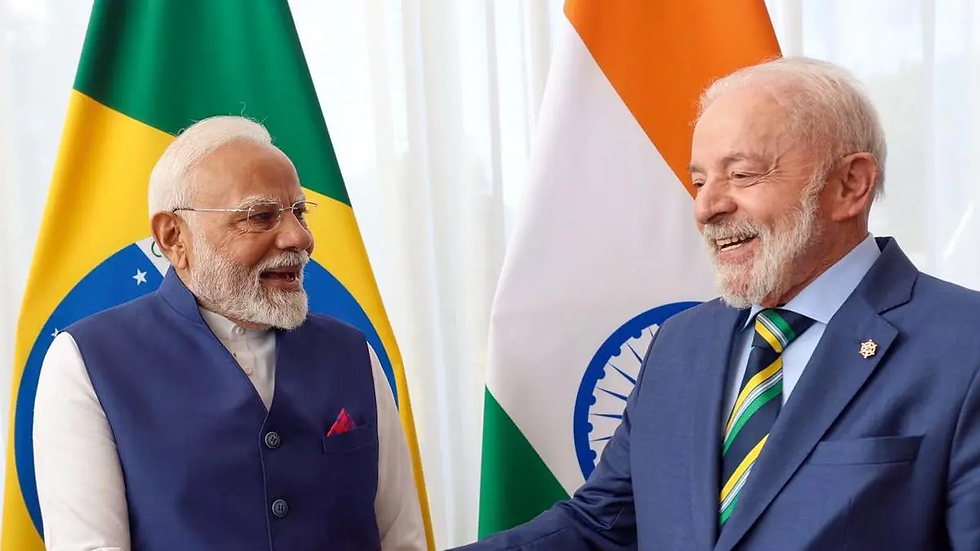India and Brazil Set $20 Billion Trade Target, Ink Key Strategic Agreements
- MGMMTeam

- Jul 9, 2025
- 4 min read
A New Chapter in India-Brazil Relations
In a significant diplomatic and economic milestone, India and Brazil have set an ambitious target to double their bilateral trade to $20 billion over the next five years. This announcement was made during Prime Minister Narendra Modi's official visit to Brasilia, where he held wide-ranging discussions with Brazilian President Luiz Inácio Lula da Silva. The two leaders reaffirmed their commitment to deepening cooperation across critical sectors, from trade and energy to technology and defence, marking a new chapter in the strategic partnership between the two emerging powers of the Global South.

Six Major Agreements Sealed
The highlight of Modiji’s visit was the signing of six key agreements that form the foundation of a deeper bilateral engagement. These pacts cover a broad spectrum of interests, including national security, digital transformation, clean energy, and intellectual property. Among them, a vital agreement focuses on counter-terrorism and tackling transnational organized crime, emphasizing both countries' shared position of "zero tolerance and zero double standards" toward terrorism.
Another agreement ensures the mutual protection of classified information, while others aim to enhance cooperation in renewable energy, digital public infrastructure (such as India's Unified Payments Interface), agricultural research, and intellectual property rights. These pacts are designed to not only stimulate trade but also create long-term institutional linkages between the two democracies.
Economic Vision and Trade Potential
Currently, trade between India and Brazil stands at approximately $12.2 billion, with Indian exports comprising diesel, pharmaceuticals, agrochemicals, and engineering goods. Brazil, on the other hand, exports crude oil, soya oil, gold, sugar, cotton, timber, and iron ore to India. By aiming to expand this to $20 billion, both nations have signaled a serious intention to restructure and diversify their economic relationship.
The two leaders also discussed enhancing the India–Mercosur Preferential Trade Agreement to lower tariffs and non-tariff barriers, enabling smoother exchange of goods and services. Additionally, plans were unveiled to open new offices of India’s Exim Bank in São Paulo and Brazil’s health regulator ANVISA in New Delhi to ease trade and regulatory processes.
Strategic Cooperation in Defence, Energy, and Tech
Beyond economics, the two countries are pursuing deeper cooperation in defence and security. This includes cyber defence collaboration, information sharing, and potentially co-developing military hardware. A new bilateral defence mechanism is expected to provide strategic direction to these efforts.
Energy cooperation emerged as another focal point. Both leaders agreed to explore joint efforts in biofuels, ethanol blending, and offshore energy exploration with carbon capture technologies. The inclusion of critical minerals, such as lithium and rare earth elements, in bilateral discussions further emphasizes the importance of future-facing resources in energy storage and green technologies.
Equally transformative is the digital cooperation framework. Brazil expressed interest in adopting India’s public digital infrastructure model, especially its payment ecosystem like UPI. India, in turn, will explore collaboration with Brazil on artificial intelligence, high-performance computing, and space technologies.
Agricultural Innovation and People-to-People Exchange
Agriculture has historically been a strong area of collaboration between the two countries. The new MoU signed between India’s ICAR and Brazil’s EMBRAPA aims to strengthen cooperation in biotechnology, crop research, and sustainable farming practices. Both countries also agreed to facilitate visa issuance and academic exchanges to strengthen people-to-people connectivity and cultural understanding.
Brazil extended an invitation to Indian pharmaceutical companies to invest in local production, hoping to benefit from India’s global reputation as a pharmacy hub.
Cultural Diplomacy and Symbolic Honors
Symbolism was not lost during the state visit. President Lula bestowed upon Prime Minister Modi Brazil’s highest civilian honour, the Grand Collar of the National Order of the Southern Cross, a mark of Brazil’s deep respect and commitment to the India-Brazil friendship.
Modiji’s analogy of Brazil’s love for football and India’s love for cricket served as a metaphor for shared goals and teamwork. "Whether the ball goes to the boundary or scores a goal, when both are in the same team, a partnership of $20 billion is not difficult," he remarked, capturing the spirit of the visit.
India and Brazil: Pillars of the Global South
Both nations see themselves as democratic anchors of the Global South and have emphasized multilateralism and South-South cooperation. India and Brazil continue to collaborate in platforms like BRICS, G20, and the IBSA Dialogue Forum. During their talks, the two leaders expressed mutual support for peaceful conflict resolution globally and committed to working jointly on global challenges like climate change, food security, and digital equity.
Conclusion: A Strategic Convergence for the Future
Prime Minister Modi’s visit to Brazil has not only strengthened historical ties but has also laid the groundwork for a robust, modern, and future-ready partnership. The agreements signed and the vision shared demonstrate a clear commitment to shared prosperity, resilience, and global leadership.
With both countries aligned on sustainable growth, digital transformation, and strategic autonomy, the path ahead seems promising. As the world faces rising geopolitical tensions and supply chain uncertainties, the India-Brazil partnership is poised to play a defining role in shaping a more balanced and inclusive global order.
(Sources: Business Line, Hindustan Times, News18)




Comments